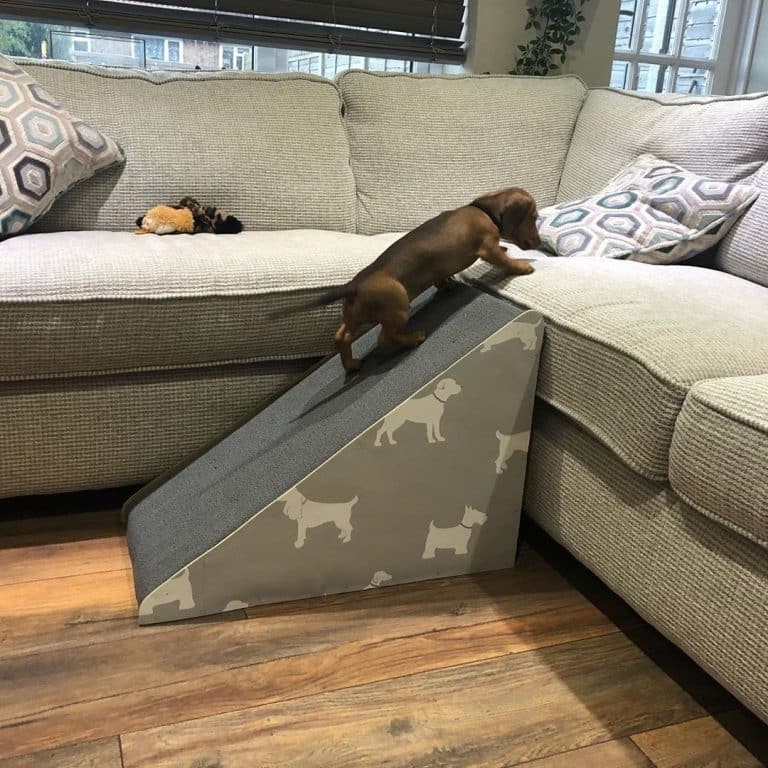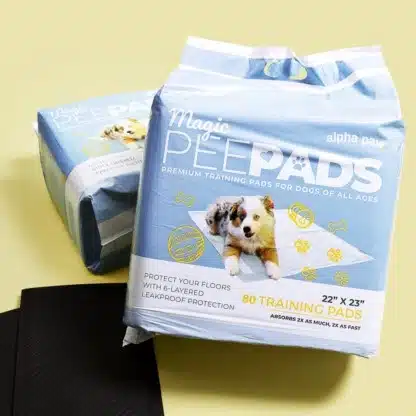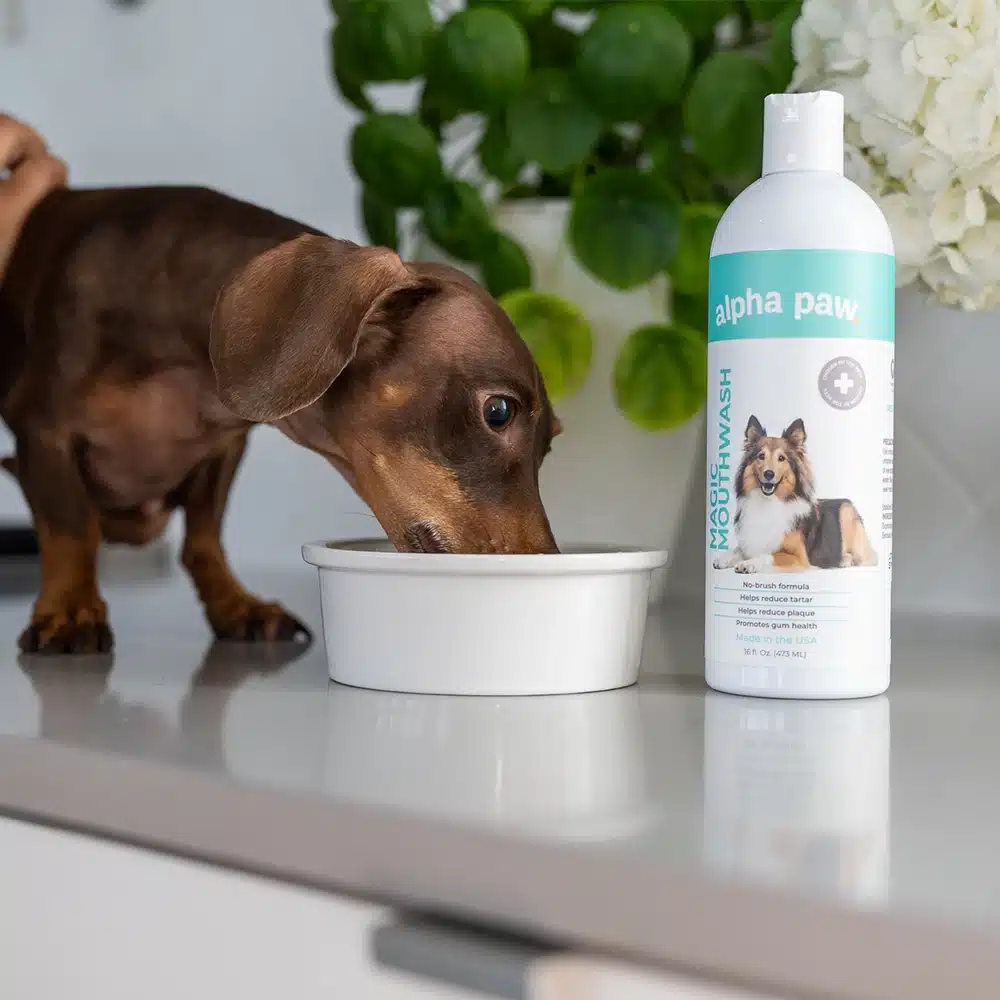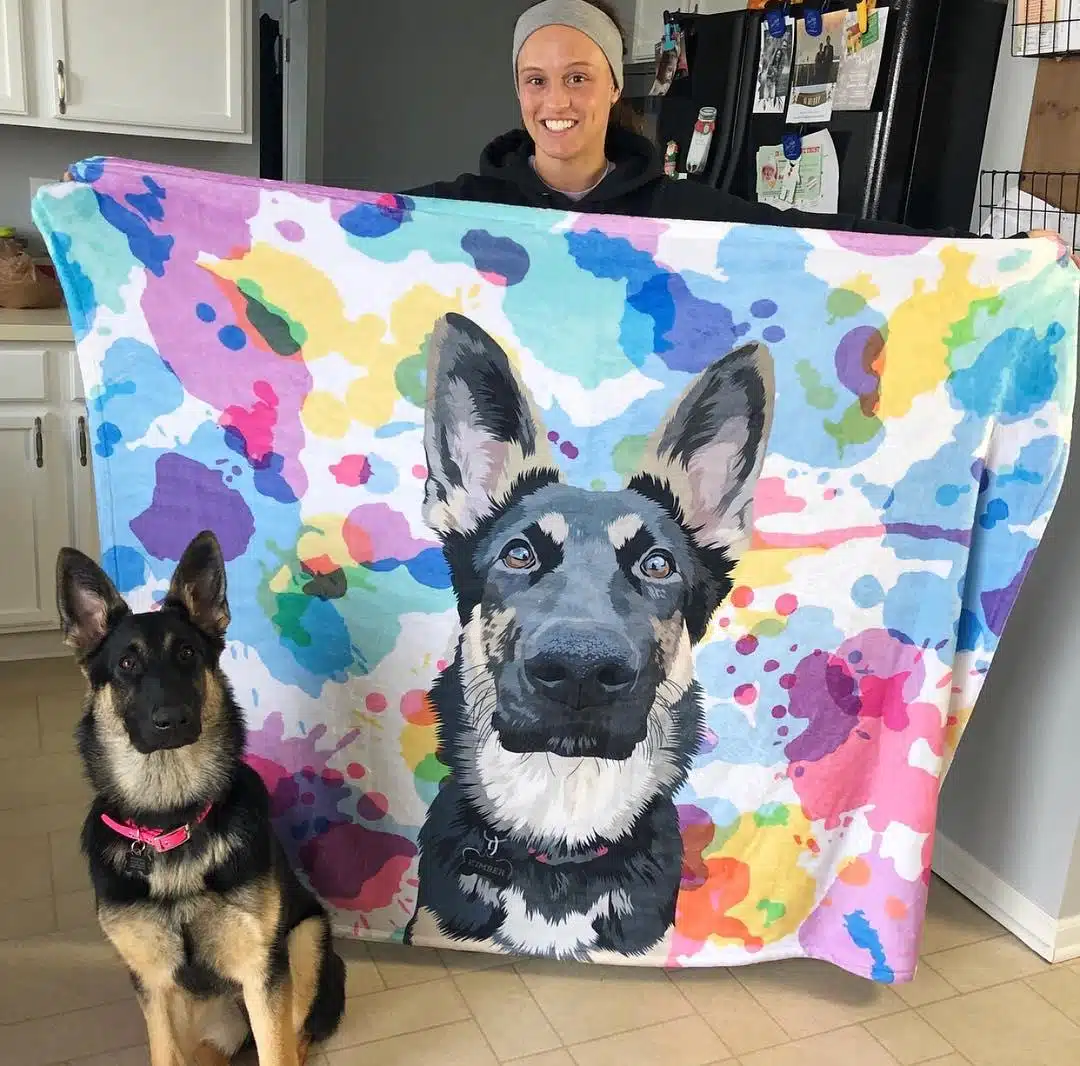Table of Contents
- 1 DIY Foam Dog Ramp—Project for a Dog Parent Architect
DIY Foam Dog Ramp—Project for a Dog Parent Architect
Image source: countottovonschnitzel
Learn how to build a foam dog ramp! Dog ramps offer lots of benefits for both you and your pooch. Your furry child can finally climb the couch without much struggle, and you are happy to see them getting there safely.
IVDD Survivor Story – Hannah & Louis
Commercial foam dog ramps can be costly, especially the ones that provide the greatest stability. If you want to do something for your pooch on your own and be creative at the same time, we have an idea—make a foam dog ramp!
With the help of our team, you can build a sturdy and durable ramp and minimize the need to pick up and carry your hairy pal around the house.
In this article, we will teach you how to make a perfect foam dog ramp and show you the benefits of its use. You will be able to use it in your home or even outdoors. So, let’s start ramping!
Things to Consider Before You Start Building a Foam Dog Ramp
Before you get down to work, there are a few things we need to cover. You don’t want to build a ramp that will be too small or too steep for your pooch to use. First, you need to take the following into consideration:
- Your pooches measurements
- The height of an object you plan to lean the ramp on
- The ramp’s design
As for your pooches measurements, you need to know the exact size and weight of your dog. If you build a smaller ramp than your pooch needs, it will turn over the second they step onto it, and your hairy pal will never try to climb it again. So, what we are trying to say is that there’s a huge difference between building a ramp for Chihuahuas or Teacup Dachshunds and German Shepherds.
You need to think about where you want to put your new foam ramp. Think about the place where your pooch struggles to climb or descend the most. Is it a bed, a couch, your vehicle? They probably all vary in height, which means that you will be able to use the ramp for only one of these. DIY dog foam ramps are usually made for one place only, so if you wish to have one with different inclines, consider purchasing an adjustable dog ramp.
We also advise you not to move the ramp around the house. Once you place it next to the bed, your pooch should know that they have access to it 24/7. If you relocate the ramp a lot, you can confuse the poor thing.
The ramp’s design is important because of the material you need to prepare. What we know for sure is that you are going to need lots of foam. But which cover are you going to use on top of it? And what are you going to use to attach it? Before we start dealing with these and other material questions, we first need to see how we can make a perfect foam ramp. So, let’s dive into it.
What Makes the Perfect Foam Dog Ramp

When choosing or building a foam dog ramp, there are a few details you need to pay attention to. Before you get down to work, make sure to read what a perfect ramp needs to have.
The Ramp Size
After you have taken your dog’s measures, it’s time to think about the size of the ramp.
As for the ramp length, it’s easy — the longer you make it, the more gradual the slope will be. We advise you to make a less steep slope. This way, you will avoid exposing your hairy companion to getting spine curvatures.
The ramp’s width should be made according to your canine’s size. In the table below, you can see our rough estimate.
| Dog’s size | Ramp width |
| Small dog | 7–11 inches |
| Medium dog | 11–15 inches |
| Large dog | 15–19 inches |
The ramp’s height depends on where you want to put it. Start measuring from the top of the area you want your pooch to reach, all the way down to the ground.
If you have a Sausage pooch in your home, here’s our suggestion for the best Dachshund ramps.
Stability Is Crucial
Your primary goal in ramp building is to make it stable for your pooch to use it safely. If you make the incline too steep, your pooch will be afraid to set a paw on it. You can make a ramp’s incline based on our following guidelines below.
| Dog’s size | Ramp’s incline |
| Small dogs | 18–25 degrees |
| Medium dogs | 22–25 degrees |
| Large dogs | 25–29 degrees |
Always have in mind that your dog should feel comfortable walking on the ramp. You need to think about keeping your dog’s joints healthy and reducing the pain they might have.
The Ramp Carpet
When deciding on which material you should use to cover the ramp, bear in mind that it should not be slippery. You need to use non-slip fabric that will provide your hairy pal with stability.
Slick material is the worst option for dog ramps! Your pooch is a clumsy little beastie who usually runs over the ramp. You don’t want to see them sliding off of it all the time.
The Ramp Bottom
One extra cautionary measure would be putting some rubber on the bottom of the ramp. Foam ramps coated in any material can get slippery on a hardwood floor and slide when your pooch starts using them. Consider sewing some extra non-slip material on the bottom.
Watch Dr. Ross’s Review on Dog Ramps
How to Build a Foam Dog Ramp
Foam is a good choice for a ramp as it is soft on your pooch’s paws. Building a foam dog ramp is not a tiring task if you follow the proper guidelines. You just need patience and suitable tools and material. Let’s see the step-by-step procedure of making this type of ramp.
Step One: Tools and Material
First of all, you need to prepare the tools and fabric you are going to use while constructing the ramp. Here’s what you should have for your little project:
- Foam
- A measuring tape or a ruler
- Knife with a long blade
- Pen
- Desired material for coating
- Sewing material
Step Two: Cutting the Foam
Foam is like bread—it’s bubbly, lightweight, and it can be cut with a knife. The longer the blade, the easier the cutting.
First, acquire a piece of foam. Its size depends on the size of a ramp you want to build. The foam should be in a rectangular shape, and your task is to carve it to look like a ramp. Next, take a pen and mark the cutting line. Use a measuring tape or a ruler to mark everything with Tetris-like precision.
To make a smoother slit, don’t cut the foam but score it instead while pressing lightly. The knife needs to be at a 90-degree angle.
Step Three: Landing
We advise you to make a dog ramp that consists of two parts—a ramp and a landing at the end of it. The landing provides your pooch with a level spot on the ramp and makes it easier for your canine to get on and off the desired objects. Some pups even choose to sleep on it, which is super cute.
You should build the landing part at the same time you’re making the rest of the ramp. You just need to carve a foam stool as a ramp extension, and of course, coat it later.
Step Four: Coating
As we’ve already mentioned, you can use a different material for coating the foam. The key is to use a non-slip fabric that will prevent your dog from slipping off the ramp.
Now, you should not use glue and staple guns to cover the foam with fabric. Some people have tried pinning the fabric to foam, but this is highly unsafe for your dog. After some time, the pins are bound to fall out and cause serious injuries to your furry one.
The proper way to cover the ramp is to make a case for it. So, what you need to do is use a sewing machine to make the case. Follow the size of your ramp and sew a case accordingly.
We advise you to make a zip-off ramp cover, as it will be much easier for cleaning and washing. Just take it off, put it in the washing machine, and put it back on once it’s clean.
If your pooch is a little villain who likes to have their paws dirty, the upholstery-grade suede fabric is a good choice as it’s resistant to stains. Cotton is also suitable for your pooch’s paws.
Step Five: Decorating
The ramp you are making should look good in your home. If you match the color of the ramp with the house furniture, your pooch won’t be the only one to enjoy their new gift.
What you should think about when making the ramp’s case is:
- Fabric
- Color
- Decorations
Decorations should also be sewn into the fabric. Here, you can express your creativity and imagination and have fun in the process.
How to Train a Dog to Use a Foam Dog Ramp
Image source: joebawn
Even though your pooch has probably managed to use the ramp with your help, they will probably still try to jump off the bed instead of using the ramp. In that case, putting a treat at the bottom of the ramp will not help, as they can try to jump over it. You need to get them acquainted with the new object first, so prepare yourself for baby steps.
Dogs learn about the world through associations. The crucial part of every dog training session is positive reinforcement, which your pooch receives through praise and treats. Getting your gorgeous woofer used to a new ramp usually takes these three steps:
- Letting your cutie sniff out the ramp
- Making contact with the ramp
- Using the ramp
The first step is to make their highness acknowledge the ramp. The moment they approach and sniff it, give them a treat. Dogs need to relate the new object with something positive. Use your hands to lure your pup to the ramp. Don’t force or push your sweetie on it—the goal is to make the little daredevil come to the ramp of their free will.
Once your hairy companion makes the first contact with the new object, it’s time for another treat. The more they touch it, the more treats and praises your pup should get. Make sure that the treats are small so that your cutie doesn’t lose focus from the activity. You can put a treat on the ramp and let them eat it, but don’t repeat this too often. They need to learn to approach the ramp without any particular cause.
The final step is using the ramp. Place it by the desired object and stand next to it. Use your hands to motivate your beloved one to climb. Again, you can show them a treat and give it to your pooch once they climb.
By now, your pooch should start using it on their own. If they are still hesitant about it, repeat some of the previous steps until you are certain that they can pull it off.
Make sure to check if your ramp is stable and sturdy before your dog starts using it. If they feel shaky tremors under their paws, canines will relate fear to this new object, and it will be days before you make them climb on it again.
There are a few more training rules that you need to stick to if you want to see your furry companion learn how to use the ramp.
- Keep them short
- Repeat each step several times
- Use positive reinforcement
You shouldn’t train your dog for too long, or they will lose focus from the activity. Keep the training session short, up to 10–15 minutes, for the best performance. Overtraining them will be counterproductive. Your woofer will get tired and associate the ramp training with negative emotions.
Repeat each step until you feel that learning has started to sink in. Train your pooch several times a day, but avoid working with them around meals. If they are hungry, you will have problems with concentration. In case they have just finished a meal, they might not be in a good mood for treats or for going up and down the ramp with a full stomach.
Positive reinforcement is perhaps the most important step in every training. Do not punish or beat your dog if the poor thing can’t immediately do what you are asking them. Every dog is different and needs some time to process the new information. Rushing them will only make things worse. If they associate negative emotions with the action, they will be less likely to repeat it. Positive reinforcement includes giving your dog:
- Treats
- Gifts
- Praise
Reasons to Get Your Dog a Foam Dog Ramp
Image source: foam4ultd
There are many reasons why your dog might need a dog ramp, but whatever your pooch is suffering from, your task is to provide them with the best conditions and enable them to roam safely around the house.
There are several more serious health issues that require obligatory ramp use, such as:
- Back problems caused by aging
- Acute injuries
- Intervertebral Disc Disease (IVDD)
As your pup ages, their bones become more brittle. Any sudden movements can cause them pain, which is why they need your help. We advise you to purchase or make a ramp for your doggo as soon as they enter their senior years.
You can always wait until you notice the first signs of aggravated moving around the house, but we like to take extra precautionary measures. Getting a ramp before your canine really needs it can help a lot in postponing the issues.
If, at some point, your precious baby got themselves injured, don’t think twice about getting the ramp. The stairs and abrupt jumping are the greatest enemies of your pooch. It takes only one second before these weak spots break again.
Intervertebral Disc Disease makes the spinal disc age faster than usual. This condition often appears with dwarf pooches, such as Dachshunds, who are more susceptible to back problems than any other breeds. IVDD is a serious condition that can lead to:
- Pain
- Limited mobility
- Paralysis
- Loss of limb function
Dogs who suffer from IVDD can’t move around the house without a ramp.
Let’s See What We Have Learned
Don’t deprive your pooch of a comfortable life. Dogs are family members, and our homes should also be adjusted according to their needs.

If you are still not certain which dog ramp you need, take a look at our suggestion below.
References
- https://en.wikipedia.org/wiki/Dog_health
- Kirkby, Kristin A., and Daniel D. Lewis. “Canine Hip Dysplasia: Reviewing the Evidence for Nonsurgical Management.” Veterinary Surgery, vol. 41, no. 1, 2011, doi:10.1111/j.1532-950x.2011.00928.x.
- Brevitz, Betsy. The Complete Healthy Dog Handbook: The Definitive Guide to Keeping Your Pet Happy, Healthy & Active. Workman Publishing Co., Inc., 2016.
80% of Dogs Develop Arthritis or Joint Pain by 7 Years old – Here’s How to Protect Them
Most of us train our dogs when they are puppies to jump up on furniture. We think it’s harmless (and easier than always lifting them), but for dogs, couches and beds are very high compared to the size of their bodies.
Every time they jump it compresses their back and applies enormous force to their joints.
It’s no wonder that an incredible 80% of dogs experience arthritis or joint pain by only 7 years old.
Luckily, there is a vet-recommended solution.
It’s the PawRamp by Alpha Paw. An adjustable ramp that allows dogs to safely get on and off couches and beds. PawRamp makes joining you in bed or on the couch effortless and fun.
As a bonus, you can use code SAVE35 to get $35 off the PawRamp today.












